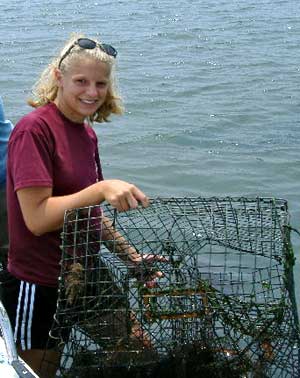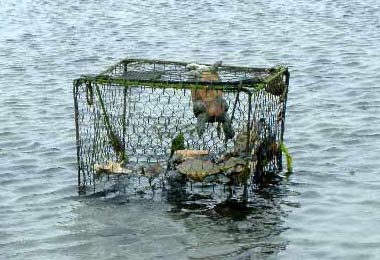|


Kaity Mattos with abandoned “ghost” trap
 | |
 |
Abandoned but Not Forgotten: Ghost Traps

By Kaity Mattos
There is something refreshing about waking up at 5 a.m. at the beach during the summer. Although many of my fellow researchers will disagree whole-heartedly, there's something to be said about the 40-mile terrapin road patrol loop first thing in the morning. The sun is just rising, the day is not yet scorching hot, and the number of injured or dead turtles is usually at a minimum. After returning to the Institute after breakfast and before the morning lab meeting, you get to proudly think, "I've been up for four hours already," as everyone else is just rolling out of bed. They hardly have a chance to rub it in that they had the extra sleep though; everyone knows that the roles will be reversed the next day.
And that's how we spent our summer: getting up with the sun, planning our days based on the tides, and building a network of friendship, support, and assistance to work towards a common goal of coastal wetland conservation. Student researchers are recruited every summer to help with the many tasks and projects associated with the May–July field season of southern New Jersey wetlands. My research project involved the removal of derelict, or "ghost," crab traps from local sounds and waterways. These traps are often put out by commercial crabbers and either forgotten, misplaced, moved by storms, or just plain left out in the water without being checked for extended periods of time. Ghost traps have a huge impact on diamondback terrapins, which may get stuck in the traps and drown during high tides.
 |
 |


Abandoned crab trap found with
more than 40 dead terrapins
 | |
Crabs, fish and other sea life can also get trapped and end up dying. Additionally, these traps are large pieces of trash that are polluting our marine environment. This project gave me the opportunity to take part in wetland conservation while opening doors toward future research in conservation policy and safe fishing practices. Even after the end of the intern program I am continuing to work with the Institute's researchers to investigate beneficial policy changes and run experiments to create safer trap regulations. The CCRP internship provided many great opportunities for me to learn about biology and discover my career interests for the future. And it was fun. I am really grateful for the experience and am excited to be able to continue my research, even if it means getting up early.
|